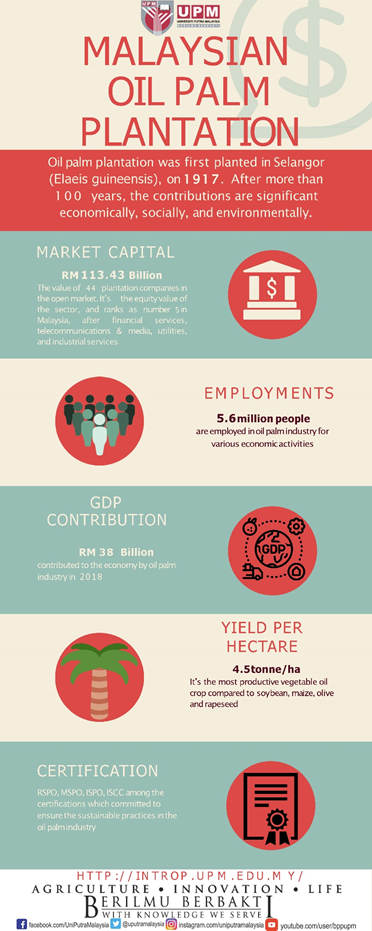Norfaryanti Kamaruddin
Institute of Tropical Forestry and Forest Products (INTROP), Universiti Putra Malaysia, Serdang, Malaysia
norfaryanti@upm.edu.my
Oil palm plantation was first established at Tennamaran Estate in Selangor, using Elaeis guineensis seed from West Africa, in 1917[1]. Since then, the oil palm industry has transformed Malaysia economically, socially, and environmentally. After more than 100 years, there are a lot of significant contributions to the country.
There are three major plantation companies back in the 50s. They are foreign-owned companies; Guthrie, Golden Hope, and Sime Darby. In the 60s, the Federal Land Development Authority (FELDA) was established to handle the resettlement of the rural poor to the newly developed areas to organise smallholder farming activities, specifically oil palm and rubber[2]. In 2019, there are 44 public-listed plantation companies in Malaysia. Their market capital value is RM113 billion, ranked as the number five in Bursa Malaysia, after financial services, telecommunication and media, utilities, and industrial services sector[3]. It contributed RM 38 billion to the GDP in 2018 (38%) from the agriculture contribution (7.3%)[4]. Furthermore, the oil palm plantation sector contributes 5.6 million jobs, including smallholder farmers, millers, industrialists, marketers, traders and others[5].
Palm oil is the most productive vegetable oil per hectare, with 4.5 tonnes per hectare[6], compared to other vegetable oils such as soybean, sunflower, maize, olive oil and rapeseed[7]. It shows oil palm has higher productivity per hectare of land.
To ensure the palm oil production is sustainable and not damaging the environment particularly, there are certifications that the industry players need to comply with. Among the major certifications are; Roundtable Sustainable Palm Oil (RSPO), International Sustainability and Carbon Certification (ISCC), Indonesian Sustainable Palm Oil (ISPO), and Malaysian Sustainable Palm Oil (MSPO). These certificates are targeted to certify the palm oil industry value chain including the smallholders. Various efforts are made to realize the target.
[1] http://mpoc.org.my/malaysian-palm-oil-industry/
[2] https://en.wikipedia.org/wiki/Palm_oil_production_in_Malaysia
[3] https://www.malaysiastock.biz/Listed-Companies.aspx?type=S&s1=12
[4] https://www.dosm.gov.my/v1/index.php?r=column/ctwoByCat&parent_id=99&menu_id=TE5CRUZCblh4ZTZMODZIbmk2aWRRQT09
[5] https://www.dosm.gov.my/v1/index.php?r=column/cthemeByCat&cat=72&bul_id=SEUxMEE3VFdBcDJhdUhPZVUxa2pKdz09&menu_id=Z0VTZGU1UHBUT1VJMFlpaXRRR0xpdz09
[6] https://www.mpoc.org.my/
[7] https://en.wikipedia.org/wiki/Table_of_biofuel_crop_yields

Date of Input: 30/03/2020 | Updated: 04/04/2024 | amallina.osman
MEDIA SHARING














.png)

.png)













